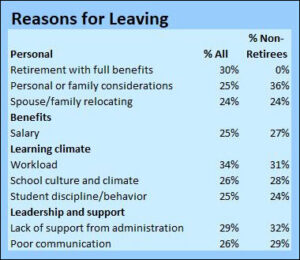John Butcher (aka Cranky) has brought to my attention a pilot exit questionnaire for teachers administered back in January 2017. The questionnaire, given to teachers leaving five “geographically and demographically diverse” school divisions, yielded 212 responses. The pilot project field tested a more comprehensive survey designed to gauge a perennial problem in Virginia public schools — teacher turnover — for purposes of analysis in future state Superintendent’s annual reports.
The results, as preliminary as they are, are fascinating. Of the 50 or so reasons teachers listed for leaving their positions, four clusters predominated: personal, such as retirement or a decision to relocate; salary (presumably too low); workload and poor learning climate; and lack of support from administration.
It will not surprise reader’s of Bacon’s Rebellion that I am particularly interested in two closely inter-related factors, “school culture and climate” and “student discipline/behavior.” Each of these factors was listed by one out of four teachers as a reason for leaving their jobs.
The analysis of the pilot questionnaire, conducted by the William & Mary School of Education, does not tell us the relative importance of the different factors. As the authors note, “the multi-categorical nature of many of the questions makes it impossible to know the weight respondents place on reasons for their departure. … Qualitative aspects of the survey should be expanded to allow respondents to describe the specific reasons for their departure.”
Another limitation of this particular questionnaire is that it reflects teacher views from only five school districts: Chesapeake, Fairfax County, Poquoson, Salem, and Washington County. It does not include any of the inner-city schools where discipline issues are most notorious. Therefore, it under-states the overall extent to which discipline (or lack of it) is a driving force in teacher churn.
Based on the anecdotal evidence I have come across, the breakdown in school discipline and the feeling among teachers that administrators are not willing to back them up is a huge factor at some schools.
The Virginia Department of Education compiles data on disciplinary infractions at every school in the Commonwealth. If the Virginia school superintendent is interested in doing a serious analysis, he would do at least two things: (1) allow teachers to weight the importance of different factors, and (2) probe the extent to which schools with the greatest number of disciplinary actions also are schools where teachers are most likely to cite disciplinary concerns and lack of administrative support as reasons for leaving.
I eagerly await the next annual report to see how Superintendent of Public Instruction James F. Lane approaches this cause for concern.


Leave a Reply
You must be logged in to post a comment.